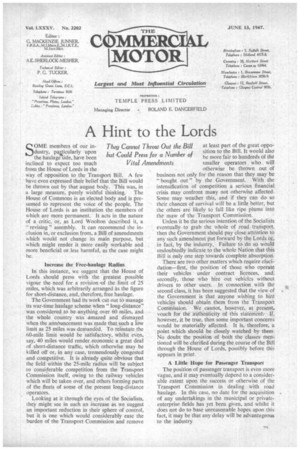A Hint to the Lords
Page 25

If you've noticed an error in this article please click here to report it so we can fix it.
SOME members Of our industry, paicularly upon the haulage side, have been inclined to expect too much from the House of Lords in the way of opposition to the Transport Bill. A few have even expressed their belief that the Bill would be thrown out by that august body. This was, in a large measure, purely wishful thinking. The House of Commons is an elected body and is presumed to represent the voice of the people. The House of Lords is an institution the members of which are more permanent. It acts in the nature of a critic, or, as Lord Woolton described it, a revising" assembly, It can recommend the inclusion in, or exclusion from, a Bill of amendments which would •not change its main purpose, but which might render it more easily workable and more beneficial or less harmful, as the case might be.
Increase the Free-haulage Radius.
In this instance, we suggest that the House of Lords should press with the greatest possible vigour the need for a revision -of the limit of 25 miles, which was arbitrarily arranged As the figure for short-distance, and, therefore, free haulage.
The Government had its work cut out te manage its war-time haulage scheme when "long-distance" was considered to be anything over 60 miles, and the whole country was amazed and dismayed when the annOuncement was made that such a low limit as 25 miles was demanded. To reinstate the 60-mile limit would be satisfactory, whilst even, say, 40 miles would render economic a great deal of short-distance traffic, which otherwise may be killed off or, in any case, tremendously congested and competitive. It is already quite obvious that the field within the 25-mile radius will be subject to consilerable competition from the Transport Commission itself, owing to the railway vehicles which will be taken over, and others forming parts of the fleets of some of the present long-distance operators.
Looking at it through the eyes of the Socialists, they might • see in such an increase as we suggest an important reduction in their sphere of control, but it is one which would considerably ease the burden of the Transport Commission and remove at least part of the great opposition to the Bill. It would also be more fair to hundreds Of the smaller operators who will otherwise be thrown out of business not only for the reason that they may be "bought out" by the Government: With the intensification of competition a serious financial crisis may confront many not otherwise affected. Some may weather this, and if they can do so their chances of survival will be a little better, but the others are' likely to fall like ripe plums into the maw of the Transport Commission.
Unless it be the serious intention of the Socialists eventually to grab the whole of road transport, then the Government should pay close attention to any such amendment, put forward by the Lords OK, in fact, by the industry. Failure to do so would undoubtedly indicate to the whole Nation that this Bill is only one step towards complete absorPtion.
There are two other matters which require elucidation—first, the position of those who operate their vehicles under contract licences, and secondly, those who hire Out vehicles without drivers to other users. In connection with the secondclass, it has been suggested that the view of the Government is that anyone wishing to hire vehicles should obtain them from the Transport Commission. We cannot, however, at present, vouch for the authenticity of this statertient: If, however, it be true, then some important concerns would be materially affected. It is, therefore, a point which should be closely watched by thenL No doubt the position of -both the classes men,-. tioned will be clarified during the course of the Bill through the House of Lords, possibly before this appears in print.
A Little Hope for Passenger Transport The position of passenger transport is even more vague, and it may eventually depend to a considerable extent upon the success or otherwise of the Transport Commission in dealing with road haulage. In this case, no date for the acquisition of any undertakings in the municipal or privateenterprise fields has yet been given, and whilst it does not do to base unreasonable hopes upon this fact, it may be that any delay will be advantageous to the industry.












































































